Listen You Can Hear the Mothers Crying in the Universe: A Black Feminist Poet’s Requiem for Our Black Warrior Toni
By Guest Contributor on November 19, 2014By Cara Page
This performative narrative will give tribute to the critical Black feminist thought and testimonials of Toni Cade Bambara.
The black feminist doctrine puts our place/our people/our spirit and politic at the center of our work
The place of our community in relationship to violence
+++++++++++++++++++++THAT WE DO NOT EXIST BECAUSE OF
++++++++++++++++VIOLENCE
The place of our black bodies in relationship to genocide
+++++++++++++++++++++THAT WE EXIST NOT BECAUSE OF OUR
+++++++++++++++++++++GENOCIDE
The place of our memory in relationship to our survival and resiliency
The place of our black resistance and that we exist
+++++++++++++++++++++NOT BECAUSE OUR OPPRESSION
but because of our power, our people, our spirit, our politics
We are more than our dead/more than our horrors/more than our slavery/more than our exploitation
This is a tribute to the Black Feminist Warrior Toni Cade Bambara and her insightful vision to rename place, resiliency and spirit of Black folks after incidences of state violence against our black children and community. Her understanding of place/of spirit/of people outside of state interrogation and interruption was a critical witnessing, contributing to a Black feminist doctrine that speaks to the resistance of Black folks, and a collective heart and mind.
She speaks
to our spirit and resiliency
to our role and place of transformation
despite state control,
despite patriarchy,
despite economic exploitation,
despite white supremacy
She created a Black feminist doctrine that speaks to the resistance of Black folks…
From both her work as a writer and videographer/ as a documentarian/ a healer and an organizer giving testimonial to the incidences of violence against our community she investigated the Atlanta Child Murders and the Bombing of Osage Avenue and the MOVE House
As an emergent artist/organizer her voice was an elixir for wounds in the written and oral echoing of truth.
Toni Cade Bambara was born March 25, 1939 in New York City. She was a mother of Karma Bene Bambara Smith, a Black feminist writer, an organizer and deeply active in the 1960s Black Arts and Black feminist movements. Bambara edited the 1970 anthology The Black Woman, a collection of essays, poetry, and short stories by such seminal writers as Nikki Giovanni, Audre Lorde, Paule Marshall, Abbey Lincoln (Aminata Moseka), Alice Walker, as well as Bambara herself. The anthology was extremely influential. In 1980, the first edition of her novel The Salt Eaters appeared in print—my bible…she also wrote two preceding collections of short stories Gorilla, My Love and The Seabirds Are Still Alive. As a filmmaker she wrote the script, while living in Philadelphia, for Louis Massiah‘s award winning documentary Bombing on Osage Avenue, which tells the story of the displaced communities after the city bombed an all Black neighborhood in an effort to remove the MOVE house.
I am also told she was a ‘take no prisoners’ Scrabble player. I met Ms. Bambara and spent some time with her at the historical conference Parallels & Intersections of Race, Class & Gender at the University of Iowa in the late 80s. It was groundbreaking for me and so was meeting Ms. Bambara. There are many Black feminists that have come to cross my path since then, that use her work as our litany for survival including my comrade and brilliant Black queer feminist warrior/Aishah Shahidah Simmons, who took several scriptwritng classes with Toni at Scribe Video Center in Philly.
Ms. Bambara passed on December 9, 1995. Her memory and vision continue on…
Her work uplifts an intergenerational Black feminist practice of carrying legacy, truth, and memory to incite action against the expendability, forced migration and genocide of Black bodies, communities & lives.
As my own black girl childhood unfolded, I was haunted by two prominent events in the United States in the late 1970s to the mid 1980s. The first was the unsolved cases of the Atlanta Child Murders, and the second was the horrific bombing—on national television—of the MOVE house in Philadelphia, PA. Both evidence of the casualties of war crimes on young Black bodies and our communities.
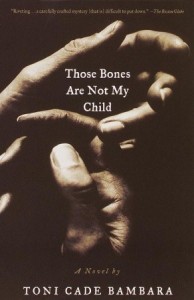 Those Bones Are Not My Child gives a literary testimonial to the impact of Black communities in the South and in the country fighting for their children’s lives during the Atlanta Child Murders in the late 1970s, early 80s, and speaks to the irrevocable killing of Black bodies. In her award acclaimed video the Bombing on Osage Avenue, Ms. Bambara gave a political tribute to the impact on the Black families and children of MOVE and of the third and fourth generation of Black neighborhoods caught between the proverbial and literal fires of the bombing of the MOVE house in the so-called city of “Brotherly Love.” She asked the critical question, “What next?” when everyone had lost interest in the ashes of Osage Avenue.
Those Bones Are Not My Child gives a literary testimonial to the impact of Black communities in the South and in the country fighting for their children’s lives during the Atlanta Child Murders in the late 1970s, early 80s, and speaks to the irrevocable killing of Black bodies. In her award acclaimed video the Bombing on Osage Avenue, Ms. Bambara gave a political tribute to the impact on the Black families and children of MOVE and of the third and fourth generation of Black neighborhoods caught between the proverbial and literal fires of the bombing of the MOVE house in the so-called city of “Brotherly Love.” She asked the critical question, “What next?” when everyone had lost interest in the ashes of Osage Avenue.
This presentation will evoke Ms. Bambara’s ability to bring a healing salve to the wounded through her truthful witnessing and her unyielding tongue to voice what others would not say about the destiny chosen for us and the one we must fight for; this is a poet’s requiem to another warrior.
We are more than our dead
We are not restless
We are steady warriors
Responding to the injustices of women, of community, of family, of our body, or our place, of our traditions as healers as warriors
The Atlanta Children murders began in 1978, with Black children’s bodies showing up by roadsides and rivers throughout the city, some with pin pricks of hypodermic needles on their arms and legs…this would become the norm for the next several years
I remember fearing this in my childhood. At 8, not knowing all my geography, the north and south still with an invisible line, thinking the murders of black children can’t come up here right?!….
By 1979, the Committee to Stop Children’s Murders (STOP), the parents and organizers of the community had created an organized response and campaign against the epidemic of murders happening in Atlanta. (Perhaps an early homage to Black Lives Matter today.) STOP’s campaign mounted an independent investigation to launch a national children’s rights movement and to establish a Black commission of inquiry into hate crimes. In 1980, a massive search for young black bodies by state and community ensues in and out of the Atlanta perimeter. STOP members were being asked to speak nationally/ while taking polygraph tests locally under the guise of major suspicion
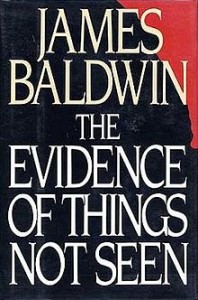 Toni Cade saw the prime suspects of the Atlanta Missing & Murdered Children’s cases were the Black parents, presumed guilty by the police from the beginning. We were black communities living under siege in the South in the last 70s by state policing, nothing different from today; but the summer of 1979 brought another layer, black children were missing from their neighborhoods and streets. The disappeared that someone needed to tell the story and tell it right. Toni Cade Bambara along with of Black writers and reporters, including James Baldwin, descended upon Atlanta to give public witnessing to this modern day lynching, that they could not let go sight unseen.
Toni Cade saw the prime suspects of the Atlanta Missing & Murdered Children’s cases were the Black parents, presumed guilty by the police from the beginning. We were black communities living under siege in the South in the last 70s by state policing, nothing different from today; but the summer of 1979 brought another layer, black children were missing from their neighborhoods and streets. The disappeared that someone needed to tell the story and tell it right. Toni Cade Bambara along with of Black writers and reporters, including James Baldwin, descended upon Atlanta to give public witnessing to this modern day lynching, that they could not let go sight unseen.
What happens to the erosion of community, a superficial sense of safety in the wake/the state taking matters of our children into their own hands
What becomes of us? A mass grave in our communities leaving scars of injustice…Toni witnessed, investigated, documented the erosion, the need, the love, the light, the liberation of community when we are drawn to the river to cross old bones and blood and memory
To be resilient
And powerful and unafraid
In the face of genocide
Toni was coaxed by a community member to write the stories of the Black mothers…
Tell it in true story form or fable, but someone needs to tell it/witness it/remember it/retell it again
We are more than our place, since we have been constantly displaced; we are our stories and our memories
Some of us are picking up from where Toni left off, trying to give public memorial and memory to this historical moment
While Atlanta was barricading black children and families from mysterious murders, the MOVE family faced similar opposition to a constant barrage of police attacks against them. MOVE in the radical tradition of the Black power movement, claiming Black space/Black intellect /Black tradition and Black revolutionary time. They fought against the police state, with daily protests outside the Philadelphia police stations, following the teachings of John Afrika, they sought to live a life free of white racist state interruption. Of course, they were constantly under watch by the U.S. government and Philadelphia police
By 1985, the first Black mayor of Philadelphia, Mayor Goode, who claimed he was being bombarded by MOVE members to set their family members free, and at the same time, Black neighbors of the MOVE house were complaining the children were dirty because they had dreadlocks, that the house had trash in the back (a compost pile) and there were loud speakers with pre-recorded teachings of John Afrika, the MOVE leader (interspersed with a lot of cussing words that neighbors were disgusted by). They began reporting many grievances against the MOVE house. Tempers had flared and Mayor Goode worked with the FBI, CIA, and local police department to do the unbelievable.
On May 12, 1985, the eve of Mother’s Day, neighbors were asked to leave the premises. Large tanks, M-60s, and artillery were hauled in by at least 500 swat and police teams. At 5 am on May 13, tear gas was thrown in the basement of the MOVE house, and thousands of rounds of ammunition were shot into the house. At approximately 10 am, an Agent Orange bomb was dropped from a helicopter onto the MOVE house. The house was left burning for at least 50 minutes, while fire trucks stood idle and watched the flames leap to the houses in the neighborhood. Third/fourth Black owned generations of houses in the city. Toni, as a Black feminist documentarian, gives voice to the community by interviewing the generations that grew up on the block of 6200 Osage Avenue.
I watched the MOVE house—at age 15—
Burn to its Black sacrifice right on television in front of me
Come see the live lynchings of Philadelphia PA
I saw myself,
Charred in the brittle bones of Black children
They were my black stars—celestial bodies taking flight
From the city of “brotherly love”
The smell of flesh
Mixed with asphalt and children’s alphabet
61 homes were lost/100 people injured/at least 15 people from the MOVE house were dead (including children); the only remaining survivors were Bird & Ramona Afrika
And 250 displaced Black folk were relocated to houses onto a wildlife preserve outside of the community and city they had helped build. They would become survivors of what community psychologists defined as, “irrational guilt.”
There was no context for me until I saw The Bombing of Osage Avenue…
Toni told the true story/not the media blitz. Right there on the street, as the families of Osage Avenue, watched in horror as they realized that the State had taken matters into their own hands and used them to justify taking such violent action against the MOVE house. In The Bombing on Osage Avenue, Toni’s screenwriting gives the spirit of the place of OSAGE Avenue (again giving testimony to place/spirit/and the people).
As Toni speaks to it, “The dismemberment of community and relationship to a place disrupted…”
Listen, you can hear the mothers crying in the universe…
We do not cower at the possibilities of those who will target black women for reproducing
Black women who will be blamed for creating generations of burdens and social warfare on the state
We will not witness and watch the slow genocide of our black children
We will instead consume the murderers, with watchful eyes, wit-full tongues, and hungry hearts, transforming our own idea of justice by giving voice to our lives, our intuition, our knowing
Listen, you can hear the Black mothers crying in the universe…
We are the bone collectors, the memory makers, the root workers, the mind benders
We name Black feminist doctrine giving bone and flesh to the forgotten and daring to witness our coming home again and again
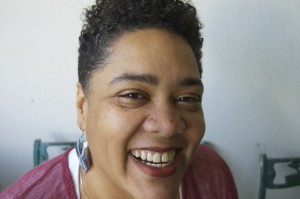 Cara Page is a Black queer feminist cultural/memory worker & organizer. She comes from a long ancestral legacy of organizers and cultural workers from the Southeast to the Northeast. For the past 20 plus years, she has worked within the queer & trans liberation movement, reproductive justice, racial and economic justice movements and the National People’s Movement Assembly. She continues to organize and create public memorials to our movement leaders, communal legacies, and mobilize transformative spaces for the safety and well-being of our communities. Cara is currently the Executive Director of the Audre Lorde Project, an organizing center for, by, and about Lesbian/Gay/Bisexual/Two Spirit, Transgender & Gender Non Conforming People of Color in New York City. She is also co-founder and former Coordinator of the Kindred Collective, a southeastern network of healers, health practitioners and organizers seeking ways to respond to and intervene on state violence & generational trauma. She is the former National Director of the Committee on Women, Population & the Environment and a proud member of Southerners on New Ground, Project South, and INCITE! Women of Color Against Violence. Cara is also a published Black feminist poet and playwright, and a guest artist of Sins Invalid. She is honored to work on this project with such feminist warriors, organizers, cultural workers, and change makers!
Cara Page is a Black queer feminist cultural/memory worker & organizer. She comes from a long ancestral legacy of organizers and cultural workers from the Southeast to the Northeast. For the past 20 plus years, she has worked within the queer & trans liberation movement, reproductive justice, racial and economic justice movements and the National People’s Movement Assembly. She continues to organize and create public memorials to our movement leaders, communal legacies, and mobilize transformative spaces for the safety and well-being of our communities. Cara is currently the Executive Director of the Audre Lorde Project, an organizing center for, by, and about Lesbian/Gay/Bisexual/Two Spirit, Transgender & Gender Non Conforming People of Color in New York City. She is also co-founder and former Coordinator of the Kindred Collective, a southeastern network of healers, health practitioners and organizers seeking ways to respond to and intervene on state violence & generational trauma. She is the former National Director of the Committee on Women, Population & the Environment and a proud member of Southerners on New Ground, Project South, and INCITE! Women of Color Against Violence. Cara is also a published Black feminist poet and playwright, and a guest artist of Sins Invalid. She is honored to work on this project with such feminist warriors, organizers, cultural workers, and change makers!
You may also like...
6 Comments
All Content ©2016 The Feminist Wire All Rights Reserved

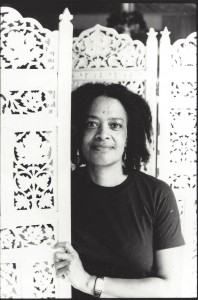
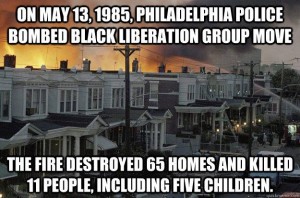

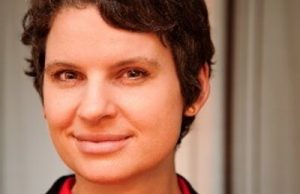

Pingback: a spell to save your life - The Feminist Wire | The Feminist Wire
Pingback: Are we ready to be well? - The Feminist Wire | The Feminist Wire
Pingback: On Toni Cade Bambara and the Darren Wilson Jury Decision - The Feminist Wire | The Feminist Wire
Pingback: One Thing: Toni Cade Bambara in the Speaking Everyday - The Feminist Wire | The Feminist Wire
Pingback: Afterword: Toni Cade Bambara's Living Legacy - The Feminist Wire | The Feminist Wire